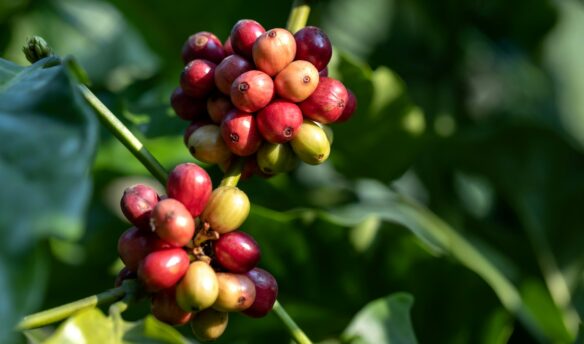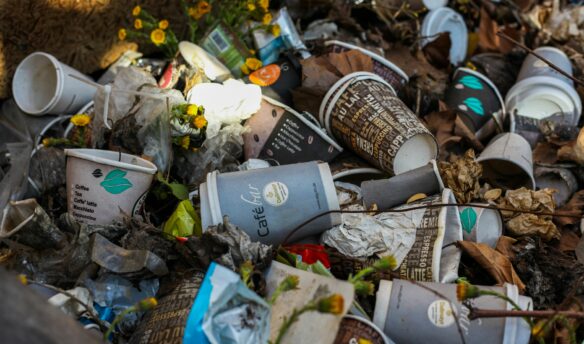Coffee makes concrete stronger. Plus, new EU packaging rules leave capsule makers in a pickle and have you ever walked through a coffee farm and seen a plant you don’t know? Never fear! A new tool will help you identify mystery coffee plants.
‘Full of Beans: Scientists Use Processed Coffee Grounds to Make Stronger Concrete’ – via the Guardian
We consume a lot of coffee—and we also throw out a lot of coffee. Researchers estimate that between six and 15 million tons of coffee grounds end up in landfills yearly, emitting methane and contributing to climate change.
Diverting coffee grounds from landfills and finding a use for it is a critical challenge for the industry. While some companies release sneakers and luxury watches made with a small amount of coffee grounds, researchers in Australia found a more structural use: turning grounds into biochar, a lightweight form of charcoal, and adding it to concrete.
Repurposing coffee grounds to add to concrete addresses two problems: it reuses waste coffee and reduces demand for sand. Sand is a critical component in concrete manufacture and is facing global shortages. To top it all off, concrete is nearly 30% stronger when made with coffee grounds.
The researchers turned the coffee grounds into biochar using a process known as pyrolysis. This process involved heating the grounds to about 350°C (662°F) in an oxygen-deprived environment to create the biochar, which was then added to the concrete mix.
“The concrete industry has the potential to contribute significantly to increasing the recycling of organic waste such as used coffee,” said joint lead author Dr Shannon Kilmartin-Lynch from the Royal Melbourne Institute of Technology. “Our research is in the early stages, but these exciting findings offer an innovative way to greatly reduce the amount of organic waste that goes to landfill.”
Kilmartin-Lynch stressed that the research is still in its initial phase, with further tests on durability needed. However, according to the university’s press release, several Australian municipalities have contacted the researchers to work with them on upcoming infrastructure projects.
‘World Coffee Research Launches Public Database for Arabica Fingerprinting’ – via Daily Coffee News
Have you ever walked through a coffee farm and seen a plant you don’t know? Never fear! World Coffee Research (WCR) has launched a new open-access arabica coffee genetic fingerprinting database, allowing for easier and cheaper variety identification and verification.
The database contains unique genetic fingerprints of 23 varieties commonly found in Latin America and is freely accessible to private and public labs to “support coffee’s evolving seed sector,” WCR said in a press release. “Similar tools are used widely in other crops by seed producers, seed traders and food manufacturers but until now, these tools have been too expensive or impractical to use for coffee on a wide scale.”
WCR scientists used over 30,000 leaf samples from six Latin American countries to create the database. They used 45 Single Nucleotide Polymorphism (SNP) molecular markers, described as “tiny genetic variations dispersed through a plant’s DNA sequence,” to generate a unique genetic fingerprint for the 23 varieties featured. SNP markers “are accurate and can be analyzed quickly and at a much lower cost than other genetic markers,” according to the press release.
How could this database be used? WCR gives an example:
“A coffee seed lot owner might want to check the genetic purity of their trees to ensure they are the correct variety. They collect small pieces of the leaves from trees they want to authenticate and send them to a genotyping lab. DNA is extracted from the leaf samples, and the SNP profile is read. The sample’s SNP fingerprint is then compared against the known SNP fingerprint for the variety in question. When the fingerprints match, the variety can be confirmed.”
Fingerprinting coffee is vital because varieties are often misidentified. If a coffee is misidentified, it can lead to issues like mislabeling a coffee or a farmer planting what they believe to be a rust-resistant variety when, in fact, the plant is highly susceptible to disease.
“We have tremendous enthusiasm for this new global public good for the coffee sector,” said WCR CEO Dr. Jennifer “Vern” Long, “and encourage widespread uptake by coffee sector actors involved in planting new trees—from funders to implementers to growers to public institutions.”
‘Coffee Capsule Conundrum: Making Sense of EU Rules’ – via STiR Coffee and Tea
The European Union accounts for three-quarters of all global sales of single-serve coffee capsules, and soon, companies selling to this market must abide by EU regulations regarding recyclability or compostability.
A pending revision to the Packaging and Packaging Waste Directive (PPWD) looks to classify coffee pods as packaging, meaning they “will be subject to the same rules for disposal as other types of packaging,” STiR Coffee and Tear reports. “If the revised PPWD becomes legally binding, companies that fill capsules must pay a packaging tax and comply with EU recyclability targets — or be made of compostable materials that fulfill mandatory composting requirements.”
In 2022, 80 billion pods were sold worldwide—just a third were made from recyclable aluminum, and only 4% were either biodegradable or compostable. The rest are made from various kinds of plastic: while some are technically recyclable, they need to be processed in specialized facilities to actually be recycled.
That’s not to mention that most pods are made with a mix of materials. A pod might be made from recyclable aluminum, but the lid is plastic. “If these new PPWD provisions come into effect … Aluminum capsules would not be permitted to use lids made of PPL (polypropylene, a non-compostable plastic). Likewise, a PPL capsule would not be able to use an aluminum lid.”
The revision will also tighten the PPWDs compostability requirement, ensuring the correct separation and disposal of all compostable materials. Under the revised rules, an aluminum pod with coffee inside would need to be carefully separated to ensure that the grounds are properly composted and the pod recycled. This requires additional specialized equipment, which not all facilities currently have.
The ideal solution would be for all pods to be compostable, but this would be a sweeping change that the article calls “not only commercially impossible” but “impossible technologically, because not all capsule designs can easily utilize compostables.” The capsule industry is fighting back, proposing amendments to the new PPWD to allow pods to keep their non-packaging status if they contain coffee grounds when thrown away. (Don’t all used pods contain coffee grounds?)
The EU parliament will now vote on these amendments. If they ratify the lobbied-for amendments, then “doomsday for the industry will be averted,” according to Fong. However, if not, the article notes, “the industry will find itself in dire straits.”
More News
‘Employees at Second Best Coffee in Kansas City Quit En Masse, Alleging a Toxic Work Environment‘ – via KCUR
‘Jibbi Little Wins Australia’s Richest Barista Competition at MICE2023′ – via BeanScene Magazine
‘Bellwether Commits to 100% Living Income Pricing by 2025‘ – via Daily Coffee News
‘Star Wide Receiver DK Metcalf Now Has A DK Metcalf Decaf Coffee‘ – via Sprudge
‘GForest, Philippine Coffee Board Partner to Boost Local Coffee Industry; Over 200,000 Coffee Trees to Flourish‘ – via PhilStar
‘Juan Valdez Unveils New Drinks With AI’ – via Global Coffee Report‘
‘The DiFluid Brew Control System Digitizes Coffee from Roast to Cup’ – via Daily Coffee News
‘Coffee Beats Tea as Britain’s Favorite Beverage, Research Suggests‘ – via ITV News
‘MICE2024 Dates Announced‘ – via Global Coffee Report
‘NOLA Coffee Festival Celebrates the Gulf South’s Coffee Industry’ – via Fresh Cup Magazine
‘Coffee Imports See Decrease, Decline Expected to Continue‘ – via Korea JoongAng Daily
‘UK’s Pret Takes Coffee Subscription Service to US and France‘ – via Reuters
‘Examining the Impact of the Fairtrade Minimum Price‘ – via Global Coffee Report
The Week in Coffee Unionizing
For three years, the union UNITE HERE helped successfully organize several coffee shops in the Boston, Massachusetts area, including Pavement Coffee, Darwin’s Ltd, 1369 Coffeehouse, Diesel Café, Bloc Café, and Forge Baking Company.
Pavement’s workers ratified a contract in August 2022, and although Darwin’s has since closed amid “contentious union negotiations,” the other cafes negotiated contracts of their own based on the Pavement agreement. According to an article in Restaurant Dive, the union now wants to make these agreements standard for negotiations with other coffee companies.
“We want to raise the floor for the industry,” said Annina Kennedy-Yoon from the UNITE HERE New England Joint Board. “People think that being a barista is not sustainable and not something that you would do as a career. And we’re trying to change that piece-by-piece.”
While Kennedy-Yoon said the contracts “may not be perfect,” they represent a good starting point. Specific demands include paid time off and clearly defined and standardized disciplinary procedures, “So if you’re late one time, you can’t just be on your final warning,” Kennedy-Yoon said. Some workers are also pushing for more inclusive anti-discrimination protections.
The article notes that the goal is to inspire the wider coffee industry. “Kennedy-Yoon said that as cafes ratify contracts in Boston,” the article reads, “workers will become more likely to organize at other shops and owners at other cafes will be forced to raise wages and improve benefits to compete for workers.”
Meanwhile, at least one previously occupied Darwin’s locations is set to become a worker-owned cooperative. Former Darwin’s baristas crowdfunded to support the impending launch of Circus Cooperative Cafe, with coffee provided by another worker coop, Rhode Island-based White Electric Coffee.
“We aspire to combine our love for good food and coffee with our goals of determining our own working conditions in a truly democratic manner,” said Caleb Zedek from Circus.
















